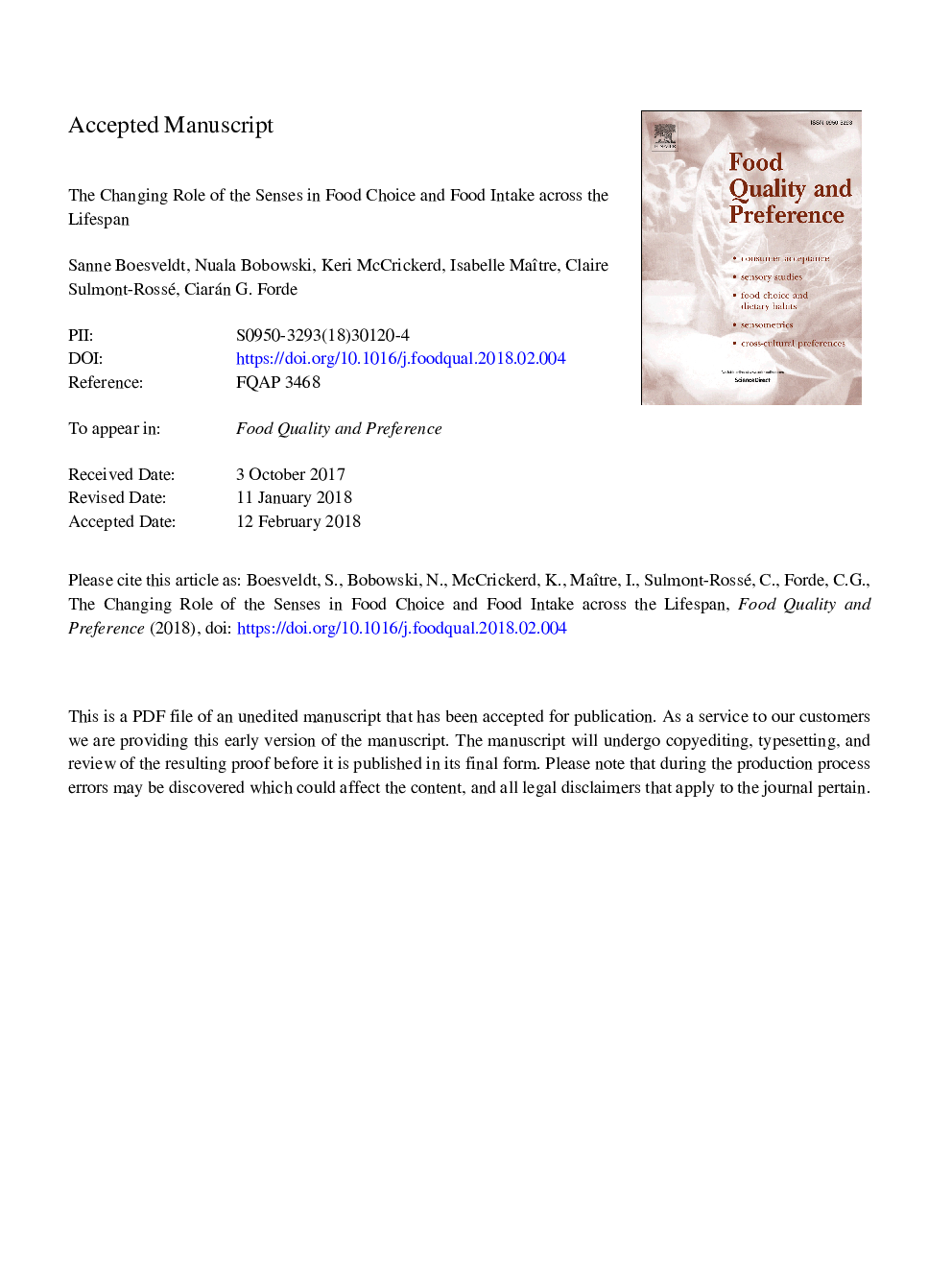| کد مقاله | کد نشریه | سال انتشار | مقاله انگلیسی | نسخه تمام متن |
|---|---|---|---|---|
| 8838423 | 1613132 | 2018 | 40 صفحه PDF | دانلود رایگان |
عنوان انگلیسی مقاله ISI
The changing role of the senses in food choice and food intake across the lifespan
ترجمه فارسی عنوان
نقش تغییر حس در انتخاب غذا و مصرف غذا در طول عمر
دانلود مقاله + سفارش ترجمه
دانلود مقاله ISI انگلیسی
رایگان برای ایرانیان
کلمات کلیدی
ادراک حسی، فرزندان، انتخاب غذا، ترجیح، چاقی، مصرف غذا، مسن، سرطان، بیماری نوروژنیک،
ترجمه چکیده
ادراک حسی قبل از تولد شروع می شود و ما را قادر می سازد تا ارتباط بیولوژیکی محرک ها را در محیط نزدیک ما تفسیر کنیم. در اوایل زندگی، حواس ها نقش مهمی در اطلاع رسانی پذیرفتن و رد کردن غذاها و نوشیدنی ها ایفا می کنند. ترجیحات غذایی با تجربه بر اساس ترکیبات تشکیل شده بین عطر و طعم غذا و نتیجه مصرف آن توسعه می یابد. در بزرگسالان نقش حس گرهای شیمیایی اغلب به "دوست داشتن" و "نداشتن" ساده ساده می شود، اما شواهد اخیر نقش یک عملکرد کاربردی تر را در هدایت رفتارهای تغذیه ای و تغذیه ایفا می کند. خواص ادراکی غذایی برای تشخیص محتوای مواد مغذی آن مهم است و از این طریق، نه تنها انتخاب مواد غذایی بلکه همچنین انتخاب انرژی معمول و رفتار مصرفی را نیز هدایت می کند. همانطور که سن ماست و شیوع بیماری مزمن افزایش می یابد، حسی حسی اغلب برای طعم، بوییدن و درک بافت کاهش می یابد و این می تواند بر ادراک غذا، ترجیح غذا و مصرف غذا تاثیر بگذارد. این باعث می شود که یک درک از تاثیر حسی بر انتخاب و مصرف برای تحریک اشتها در طول دوره هایی که مصرف مواد مغذی ممکن است در معرض خطر قرار گیرد. این مقاله خلاصه ای از دانش فعلی در حال تغییر نقش حواس در دوران کودکی و دوران کودکی، تا بزرگسالی، سن و بیماری است. هدف این است که فرصت هایی را برای بهبود سلامت و سلامتی از طریق درک بهتر اینکه چگونه عوامل حساس می تواند رفتارهای تغذیه ای و تغذیه در زمان های کلیدی در طول عمر را تحت تاثیر قرار دهد، برجسته می کند.
موضوعات مرتبط
علوم زیستی و بیوفناوری
علوم کشاورزی و بیولوژیک
دانش تغذیه
چکیده انگلیسی
Sensory perception begins before birth and enables us to interpret the biological relevance of stimuli in our near environment. In early life, the senses play a crucial role in informing acceptance and rejection of foods and beverages. Food preferences develop with experience based on associations formed between a foods flavour and the consequence of its consumption. In adulthood the role of the chemical senses is often simplified into simple 'likes' and 'dislikes', but recent evidence highlights a more functional role in guiding eating behaviours and nutrition. A food's perceptual properties are important for the detection of its nutrient content and through this, guide not only food choice but also habitual energy selection and consumption behaviour. As we age and the prevalence of chronic disease increases, sensory acuity often declines for taste, smell and texture perception, and this can have an impact on food perception, preference and food intake. This creates an opportunity to apply an understanding of sensory influences on choice and intake to stimulate appetite during periods where nutrient intakes may become compromised. This paper summarises current knowledge of the changing role of the senses during infancy and early childhood, through to adulthood, older age and illness. The aim is to highlight opportunities to improve health and wellness through a better understanding of how sensory factors can influence eating behaviours and nutrition at key time points across the lifespan.
ناشر
Database: Elsevier - ScienceDirect (ساینس دایرکت)
Journal: Food Quality and Preference - Volume 68, September 2018, Pages 80-89
Journal: Food Quality and Preference - Volume 68, September 2018, Pages 80-89
نویسندگان
Sanne Boesveldt, Nuala Bobowski, Keri McCrickerd, Isabelle Maître, Claire Sulmont-Rossé, Ciarán G. Forde,
